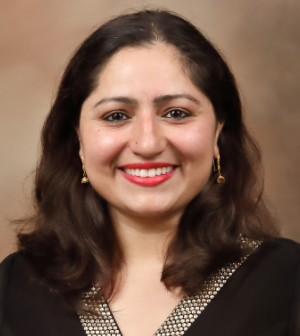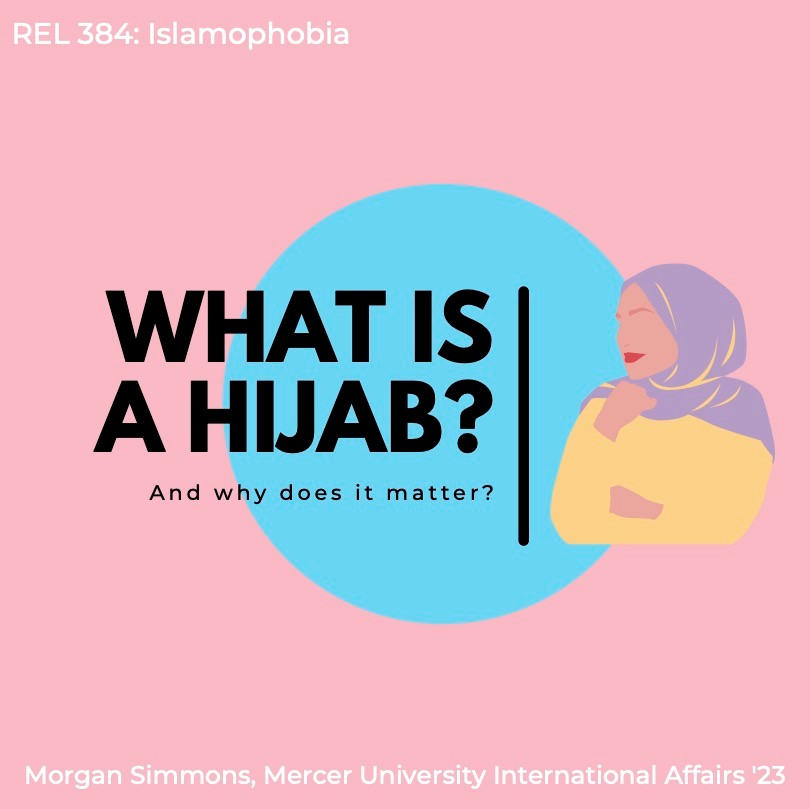Mercer University students in a service-learning course this spring created materials to help dismantle Islamophobia — the irrational fear and discrimination of people who practice Islam.
The class, REL 384: Seminar on Selected Topics in Religion: Islamophobia, had several goals: contextualize and historicize Islamophobia in the United States, show what Muslims are doing about Islamophobia, and introduce students to local Muslims, said Dr. Shehnaz Haqqani, assistant professor of religion in the College of Liberal Arts and Sciences, who taught the course.
As part of their research, students took three workshops taught by the Council on American-Islamic Relations, the nation’s largest Muslim civil rights and advocacy organization. They also spent time at the Islamic Center of Macon to learn about how Islamophobia impacted people on a local level.

“I wanted my students to get a sense of what those Muslims are like, what they’re doing for Macon, what they say about their experiences with Islamophobia, and what they want their neighbors to know about them,” Dr. Haqqani said.
Initially, the Mercer students met with middle and high school students at the mosque during their Sunday school lesson, said Imam Muhammad Abbasi, who has served as a full-time imam and principal of the weekend Sunday school at the Islamic Center of Macon since 2019.
“We had a discussion in which we gave them a brief intro of what we do in our mosque, what are some of the activities that we do here,” he said. “And then students from our center shared some of their experiences related to Islamophobia. It was a very nice experience, and the kids also liked it, so it was great. …
“Some of the (Mercer) students even came later on just to observe some of the activities, like we had Friday prayer and then we had a community event, and they were there.”
From these conversations, observations and teachings, the Mercer students created resources to counter Islamophobia. The Council on American-Islamic Relations continued to work with students throughout their projects.
Sierra Hathaway, who graduated in May with a Bachelor of Science degree in biochemistry and molecular biology, created a framework for an anti-Islamophobic curriculum for middle and high schools.
“What she does is to define key terms related to Islamophobia and then offers suggestions for what textbooks, etc. are essential for teaching Islam in a way that is not Islamophobic, that is not Orientalist, that is not racist, that is inclusive and as honest and accurate as possible,” Dr. Haqqani said.

Hathaway said her conversations with students at the mosque inspired her to create the trifold pamphlet. The school-age children she spoke to told her they were bullied and often asked questions about Islam. Non-Muslim students saw them as spokespeople for their religion just because they practiced it.
“That just unsettled me,” she said. With the pamphlet, “the teachers and administration are better suited to answer those questions rather than having to rely on those students.”
Another student produced a video explaining why some questions that people ask Muslims are problematic.
“This student went to the mosque, interviewed or talked with Muslims about the kinds of questions that they have received from people that are problematic and how to correct those questions,” Dr. Haqqani said. “Those questions might be well-meaning, but they have very problematic assumptions or very racist assumptions and Islamophobic assumptions.
“So, the student first explains why those questions are problematic and then how to correct them — how to ask better questions that are less harmful.”
Another student made a booklet about the hijab and the veiling practice among Muslims.
“The student tried to contextualize the head covering and the kinds of questions that we ask, the assumptions we make, and the double standards that come with what we perceive of Muslim women who cover their heads, but we don’t do the same, for example, for nuns or other people who cover their heads in other religions,” Dr. Haqqani said. “She also tried to get people to unpack their biases and misinformed assumptions about how Muslim women dress and why they dress that way.”

Dr. Haqqani said she’d like to distribute some of the students’ materials locally and eventually make them available online.
Islamophobia is harmful because it dehumanizes those who are affected by it, Dr. Haqqani said.
“It’s very important that we see stereotypes, the assumptions that we hold about Muslims, that we’re aware of them, that we’re critical of them, and we reject them because it can subconsciously or explicitly affect the way we see Muslims as legitimate humans or not,” she said.
Hathaway said the course’s service-learning aspect enhanced the class.
“I would have really hated to learn about how Islamophobia is in the United States and Western countries and not have been able to help combat it in some way,” she said.
The students who took the course “were so aware, and they were so committed to challenging Islamophobia,” Dr. Haqqani said. “They spoke frequently about their personal experiences with family members or community members who had very Islamophobic approaches to Islam and to Muslims, and they really wanted to fix that. They really wanted to change those attitudes.
“They were just so incredibly brilliant and so willing to contribute to dismantling those ideas and those attitudes. It was a fantastic class.”










